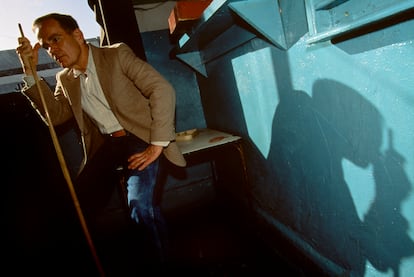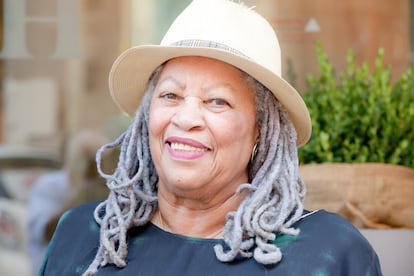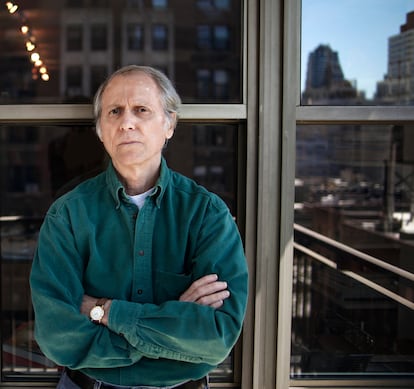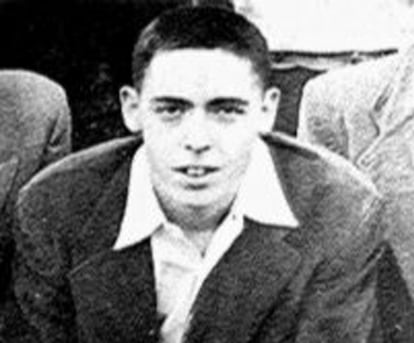Cormac McCarthy, the end of an era in American literature
The author of ‘Blood Meridian’ was one of the last remaining representatives of an extraordinary generation of literary creators born in the 1930s that included Sylvia Plath, Susan Sontag, Joan Didion and Philip Roth

Cormac McCarthy’s death marks the end of an era in the recent history of American literature. Without the slightest doubt, its effect will be felt on a global scale. The author of Blood Meridian opened new paths beyond the borders of his country. The relentless plasticity and brutal beauty of his stories were reflected in indelible images that easily adapted to the language of cinema. McCarthy’s stories are an invitation to gaze into an uncomfortable abyss that can be dangerous because it reflects the darkest side of the human condition. His death leaves a void that makes us wonder about the future of literature in general and American letters in particular.
Debatable, but almost always accurate, Harold Bloom once stated that the four pillars on which American literature of the future would be based were Cormac McCarthy, Philip Roth, Don DeLillo and Thomas Pynchon. The first two, exact contemporaries, have departed this world. The other two authoritatively preside over the U.S. literary scene from the shadows. The striking thing about Bloom’s quartet is that all its members were born in the 1930s, but there are names missing. Let’s add them, arranged by birth year: 1930, John Barth; 1931, Toni Morrison; 1932, Sylvia Plath, Robert Coover and John Updike; 1933, Philip Roth, Cormac McCarthy and Susan Sontag; 1934, Joan Didion and Janet Malcolm; 1935, E. Annie Proulx; 1936, Don DeLillo; 1937, Thomas Pynchon; 1938, Raymond Carver and Joyce Carol Oates.

For the purposes of literary stature, not a single name is superfluous. Plath, a poet of the first magnitude, wrote a memorable novel, The Bell Jar. The legacy of Sontag, Didion and Malcolm, three of the most prominent intellectual figures of the last decades in their country, is still fully valid today. As a storyteller, no one would match Carver for a long time. Though less well known today, the importance of Robert Coover, one of the pioneers of postmodernism, cannot be overstated. The Updike case is significant: his figure, once colossal, is fading irreversibly little by little.
On the contrary, despite attempts to cancel him on the grounds of political correctness, Roth has turned out to be indestructible. Bloom was oblivious to this type of approach, but if one wanted to find a quartet of female storytellers within the same decade, it would be only fair to mention Toni Morrison, Joyce Carol Oates, E. Annie Proulx and Marylinne Robinson (the latter born in the 1940s). Morrison’s caliber was recognized with the Nobel Prize in 1993. Heiress to Virginia Woolf and William Faulkner in equal parts, she is chiefly responsible for the configuration of large areas of the U.S. literary map today.

The other members of the quartet are not far behind. Proulx’s hallmark style has much in common with McCarthy’s world, with a wild feeling for the landscape and fondness for danger and for rootless characters. Although her work does not reach the levels of cruelty of the author of The Road, she is his equal as a narrator. Proulx published her first book at age 55. A champion of environmental causes and winner of the National Book Award in 1994 for The Shipping News, she is best known for her short novel Brokeback Mountain, which was brought to the screen and won three Oscars. Joyce Carol Oates is a supernatural case: author of 60 novels, many of them of extraordinary merit, her portrayal of the United States is no less remarkable than that of any of the members of Bloom’s quartet. As unprolific as Proulx, Marilynne Robinson is a narrator of exquisite psychological depth within whose brilliant career one of the highlights is Gilead, a novel with which she won the Pulitzer Prize.

Regarding gender issues, it is interesting to see the position of the authors themselves. In a witty review of No Country For Old Men, Oates ironized about the aesthetics of masculinity cultivated respectively by Updike and McCarthy, noting that there was more eroticism in McCarthy’s treatment of violence than in Updike’s explicit treatment of heterosexuality. As for Proulx, when she learned that a literary competition she had entered was restricted to women, she withdrew her name, saying that for her it was only possible to speak of individuals whose trade is writing.
If we abide by this criterion, the two individuals of McCarthy’s generation who remain at the literary top after his death are Don DeLillo and Thomas Pynchon. Each one in his own way has changed the course of contemporary literature.

If there is a name that has earned the unanimous respect of his colleagues in the United States, it is Don DeLillo. After leaving behind monumental works such as White Noise and Underworld, DeLillo entered an increasingly subtle phase, with titles such as Body Art, Point Omega and Zero K. Don DeLillo’s novels are works of quiet grandeur and his prose is of the highest quality being written in America today. The universal consensus is that no one writes sentences like him. DeLillo, a down-to-earth man who was never elusive, disappeared from public life after the publication of The Silence in 2020. The feeling his absence inspires is one of respect. I had the honor of interviewing him on four occasions. The last interview, after the publication of The Silence, was conducted by telephone and it was very brief. During the 20 minutes it lasted, DeLillo sounded tired and he had difficulty speaking. After his retirement, the suspicion is that he will never publish again.
Pynchon’s case is radically different. He shares with Cormac McCarthy a disdain for everything that has to do with the banality of literary life. Awarded the most prestigious prizes in the country, the Pulitzer and the National Book Award, neither one of them went to collect them. Pynchon even sent a clown to represent him.

Intriguingly, David Foster Wallace predicted that perhaps 25% of Pynchon’s work would survive. One would have to wonder what part of his work he was thinking of because, as with DeLillo or McCarthy, there are several Pynchons. He revolutionized the concept of literature with novels such as V or Gravity’s Rainbow. The list of authors who have declared themselves indebted to him is endless, and includes William Vollman, Richard Powers, David Mitchell, Dave Eggers and Salman Rushdie, to name a few. After transforming the literary landscape of his time, he became more accessible. The irony is that it is his most difficult and revolutionary work that is most illegible today. Pynchon’s enigmatic silence remains unassailable. The light-hearted Bleeding Edge, his latest novel, was published a decade ago. Will we read one of his books again? When a jovial-looking McCarthy published The Passenger and Stella Maris a few months ago, there was little reason to suspect that death was lurking around the corner. Perhaps he was the only one to know that the silence he had entered into was final.
Sign up for our weekly newsletter to get more English-language news coverage from EL PAÍS USA Edition
Tu suscripción se está usando en otro dispositivo
¿Quieres añadir otro usuario a tu suscripción?
Si continúas leyendo en este dispositivo, no se podrá leer en el otro.
FlechaTu suscripción se está usando en otro dispositivo y solo puedes acceder a EL PAÍS desde un dispositivo a la vez.
Si quieres compartir tu cuenta, cambia tu suscripción a la modalidad Premium, así podrás añadir otro usuario. Cada uno accederá con su propia cuenta de email, lo que os permitirá personalizar vuestra experiencia en EL PAÍS.
¿Tienes una suscripción de empresa? Accede aquí para contratar más cuentas.
En el caso de no saber quién está usando tu cuenta, te recomendamos cambiar tu contraseña aquí.
Si decides continuar compartiendo tu cuenta, este mensaje se mostrará en tu dispositivo y en el de la otra persona que está usando tu cuenta de forma indefinida, afectando a tu experiencia de lectura. Puedes consultar aquí los términos y condiciones de la suscripción digital.








































